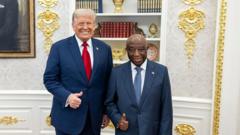As the Dalai Lama turns 90, followers gather in India to seek insights on the future of Tibetan leadership.
**Dalai Lama Celebrates 90th Birthday Amid Succession Speculations**

**Dalai Lama Celebrates 90th Birthday Amid Succession Speculations**
Exiled Tibetan leader hints at potential successor plans during landmark birthday celebrations.
Hundreds of devoted followers have assembled in Dharamsala, India, to celebrate the Dalai Lama's milestone 90th birthday, sparking discussions about the future of the Tibetan spiritual leadership. This year’s celebration takes place against the backdrop of rising inquiries regarding who might succeed him. Ahead of the festivities, the Dalai Lama is expected to release a video message and statement that may illuminate his succession strategy.
Fleeing Tibet in 1959 due to a failed uprising against the Chinese government, the Dalai Lama has since served as a symbolic leader for Tibetans in exile, establishing a government-in-exile in northern India. The recent celebrations have attracted over 7,000 guests, including notable figures such as actor Richard Gere, who has been a long-time supporter.
In remarks made earlier this week, the Dalai Lama indicated that there would be a framework established regarding the continuation of the Dalai Lama institution, though he refrained from providing detailed insights. His past statements on succession have been varied, suggesting that his successor could be female or that the line may end with him, sparked by debates within the Tibetan community about the role’s future.
Tibetan parliament-in-exile member Youdon Aukatsang expressed skepticism over expecting a clear procedure regarding succession to emerge from the birthday celebrations. However, he acknowledged the significance of the Dalai Lama as a unifying force, emphasizing the need for a recognized successor to maintain continuity within the Tibetan movement. Despite the uncertainty, he reinforced the ongoing importance of the Dalai Lama's legacy and the necessity for new leaders to rise.
Experts in international relations have warned that China may attempt to impose its own version of a successor, purporting that only the Communist Party has the authority to recognize the reincarnation of the Dalai Lama. This move would likely be opposed by many Tibetans who hold steadfast beliefs about genuine succession as traditionally recognized within Tibetan Buddhism.
The current Dalai Lama, who was identified as the reincarnation of his predecessor at the age of two, has gone through an extraordinary journey, crucially impacting the Tibetan identity and spiritual landscape. Despite the cultural and political adversity faced by Tibetans, celebrations are filled with hope for the future, even among those who fled and their descendants, who maintain a deep connection to their homeland.
As the ceremonies proceed, many are hopeful that the Dalai Lama's message will provide clarity on the future of Tibetan Buddhism and its leadership, accentuating the collective aspirations of the Tibetan people amidst ongoing hardships under China’s governance.
Fleeing Tibet in 1959 due to a failed uprising against the Chinese government, the Dalai Lama has since served as a symbolic leader for Tibetans in exile, establishing a government-in-exile in northern India. The recent celebrations have attracted over 7,000 guests, including notable figures such as actor Richard Gere, who has been a long-time supporter.
In remarks made earlier this week, the Dalai Lama indicated that there would be a framework established regarding the continuation of the Dalai Lama institution, though he refrained from providing detailed insights. His past statements on succession have been varied, suggesting that his successor could be female or that the line may end with him, sparked by debates within the Tibetan community about the role’s future.
Tibetan parliament-in-exile member Youdon Aukatsang expressed skepticism over expecting a clear procedure regarding succession to emerge from the birthday celebrations. However, he acknowledged the significance of the Dalai Lama as a unifying force, emphasizing the need for a recognized successor to maintain continuity within the Tibetan movement. Despite the uncertainty, he reinforced the ongoing importance of the Dalai Lama's legacy and the necessity for new leaders to rise.
Experts in international relations have warned that China may attempt to impose its own version of a successor, purporting that only the Communist Party has the authority to recognize the reincarnation of the Dalai Lama. This move would likely be opposed by many Tibetans who hold steadfast beliefs about genuine succession as traditionally recognized within Tibetan Buddhism.
The current Dalai Lama, who was identified as the reincarnation of his predecessor at the age of two, has gone through an extraordinary journey, crucially impacting the Tibetan identity and spiritual landscape. Despite the cultural and political adversity faced by Tibetans, celebrations are filled with hope for the future, even among those who fled and their descendants, who maintain a deep connection to their homeland.
As the ceremonies proceed, many are hopeful that the Dalai Lama's message will provide clarity on the future of Tibetan Buddhism and its leadership, accentuating the collective aspirations of the Tibetan people amidst ongoing hardships under China’s governance.




















